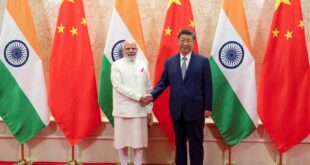The West is feverishly seeking someone to blame for the catastrophic situation in the Middle East. Following on from John Kerry, French Foreign Minister Jean-Marc Ayrault has announced his intention to request that the International Criminal Court investigate Russian «war crimes» in Syria.
Hillary Clinton, a contender for the post of US president, is also known for her attempts to put Russia in the dock. During the second presidential TV debate with Donald Trump on 9 October, she stated she supported efforts to probe «war crimes committed by the Syrians and the Russians and try to hold them accountable».
So do we need to clarify, once again, who is to blame? Let’s try.
America’s ‘Greater Middle East’ strategy, which involves violently redrawing the political map of a vast region, has destroyed the states of Syria, Libya, Iraq and Yemen, and has led to an unprecedented surge in terrorism, a tremendous loss of human life, and a large influx of refugees to Europe.
But America does not want to take the blame for what it has done.
Ahead of the change of administration in America, US legislators have been trying to make Saudi Arabia primarily responsible for the spread of terrorism. On 28 September, the US Senate and the House of Representatives passed the Justice Against Sponsors of Terrorism Act (JASTA), which entitles the relatives of US citizens killed in the 9/11 attacks to file lawsuits against Saudi Arabia and receive compensation.
Five days later, on 3 October, an article appeared in the Arab language newspaper Rai Al-Youm (published in London), written by its editor-in-chief Abdel Bari Atwan, that sheds light on which way the Arab world is leaning on the issue of who’s to blame.
A few words about the article’s author. Abdel Bari Atwan is the most prominent of today’s Arab journalists. The son of a refugee from Gaza, he was involved in the struggles of the Palestine Liberation Organisation (PLO) for a long time and was close to Yasser Arafat until they parted ways in 1993, when he disagreed with the hasty conclusion of peace with Israel. In the 1990s, he opposed UN sanctions against Iraq; not in defence of Saddam Hussein, however, but in defence of the rights and interests of the Iraqi people. In recent years, Atwan has written a great deal on the importance of establishing friendly relations between Sunni Arab states and Shi’ite Iran.
In his article, entitled «US law firms sharpening their knives for Saudi Arabia», Abdel Bari Atwan suggests how the Saudi authorities can oppose American blackmail. Here are his recommendations to Riyadh.
– Stop the senseless and bloody war in Yemen.
– Wind down its support of jihadist organisations in Syria.
– Take steps to normalise relations with Iran and Iraq.
– Seriously address the creation of an Arab lobby in the US (a pressing issue, since the Israel lobby in America is multilayered, works closely with the media and funds major research centres, while the Saudi lobbying effort is limited to banal bribery).
– Withdraw most of Saudi Arabia’s assets and investments from the US as soon as possible.
– Suspend all negotiations with Washington on an oil price agreement.
– Adopt measures allowing oil from the Persian gulf to be quoted in currencies other than US dollars (i.e. euro, yuan and roubles).
– File countersuits against the US through Muslim human rights organisations for war crimes committed in the Middle East between 2003 and the present day.
Abdel Bari Atwan says it is unlikely that the Saudi authorities will listen to him, but it seems as if the initiative has already struck a chord in other Arab countries. A group of Iraqi parliamentarians headed by Najeh al-Mizan has put forward a bill allowing Iraqi citizens to demand compensation from the US government for war crimes committed during the years of occupation (2003-2011) not just by the regular American army, but also contract soldiers from private military companies and ‘death squads’ set up using CIA money.
The outcome of America’s ‘presence’ in Iraq (or rather ‘the American genocide’) is truly horrifying. Even according to official (underestimated) data from the John Hopkins Institute, Americans and their accomplices killed 250,000 people (civilians) in Iraq during the occupation. According to Professor Juan Cole from the University of Michigan, this figure (direct losses) is as much as 450,000 people. Added to the victims of US sanctions in the 1990s, the number of deaths is close to one million. Most of these were children. Nobody can accuse US academic Juan Cole of incompetence or lobbying – he is a world-renowned expert on the modern Middle East and South Asia, a specialist in the history of Iran and Arab countries, and the author of 14 academic monographs.
But that is only the direct losses. There is also the destruction of Iraq’s state institutions and its law enforcement, health and education systems as a result of the American occupation, and the disintegration of relations between ethnicities and faiths.
The repercussions of the ‘Iraqi holocaust’ carried out by the Americans will be felt for many years to come. Here are some figures from the Australian scientist Dr. Gideon Polya. During the years of the crisis, there were 7.7 million refugees in Iraq. Of these, 5 million were internally displaced persons and 2.7 million fled the country. These included the cream of Iraqi society: doctors, teachers, engineers, university professors and businessmen. During the first few years of the occupation, 2,200 doctors and nursers were killed in Iraq. As a consequence of America’s use of bombs with low-enriched uranium, the number of cancer patients in the country increased from 40 per 100,000 people (1990) to 1,500 per 100,000 people (2005). And as a result of the actions of the occupation forces and sectarian fighting, there are currently three million widows and five million orphans in the country. 1.5 million Iraqi children are undernourished.
The world has not forgotten about the war crimes committed by America in the Middle East. Sooner or later, the US will have to answer for these crimes, no matter what Hillary Clinton says.
This article was originally published on Strategic Culture Foundation website
 Geostrategic Media Political Commentary, Analysis, Security, Defense
Geostrategic Media Political Commentary, Analysis, Security, Defense





